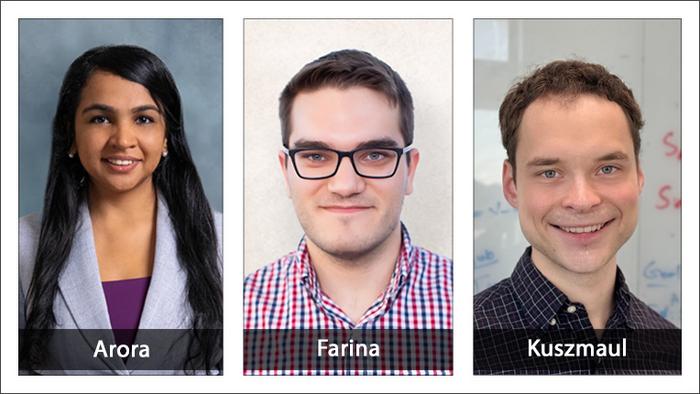ACM, the Association for Computing Machinery, today announced that Nivedita Arora, of Northwestern University is the recipient of the ACM Doctoral Dissertation Award for her dissertation “Sustainable Interactive Wireless Stickers: From Materials to Devices to Applications,” which demonstrated wireless and batteryless sensor nodes using novel materials and radio backscatter.

Credit: Association for Computing Machinery
ACM, the Association for Computing Machinery, today announced that Nivedita Arora, of Northwestern University is the recipient of the ACM Doctoral Dissertation Award for her dissertation “Sustainable Interactive Wireless Stickers: From Materials to Devices to Applications,” which demonstrated wireless and batteryless sensor nodes using novel materials and radio backscatter.
Arora’s research envisions creating sustainable computational materials that operate by harvesting energy from the environment and, at the end of their life cycle, can be responsibly composted or recycled. Her research process involves working at the intersection of materials, methods of fabrication, low-power systems, and HCI. She actively looks to apply her work to application domains such as smart homes, health, climate change, and wildlife monitoring.
Arora’s dissertation makes truly groundbreaking contributions to the fields of Ubiquitous Computing and Human-Computer Interaction. Today’s Internet of Things (IoT) devices are bulky, require battery maintenance, and involve costly installation. In contrast, Arora shows how the computational capabilities of sensing, communication, and display can be diffused into materials and everyday objects. She builds interactive stickers that are inexpensive, and easy to deploy and sustainably operate by harvesting energy from body heat or indoor light. She demonstrates this idea over a series of projects. Her first effort, SATURN, is a thin, flexible multi-layer material that is a self-sustaining audio sensor. Specifically, it uses the vibration itself to power the ability to capture and encode the vibration sensor. SATURN was extended to ZEUSSS to use passive RF backscatter for wireless transmission on the vibration signal. She followed this up with the MARS platform that produces an extremely low-power (less than a microwatt) resonance circuit that varies its frequency based on user interaction with interfaces that create inductive or capacitive loads on the circuit. Coupling this circuit with FM passive backscatter and ambient power harvesting allows user interfaces such as touch-sensitive buttons, sliders, and vibration sensors to communicate at a distance. The result of these three projects is a flat user interface in a post-it note form factor that can be deployed in the environment simply by sticking it to a flat surface. The flat user interface and mobile design allows for applications such as light switches or audio volume sliders that can simply be pasted where they are needed without worrying about wiring the infrastructure or maintaining batteries.
The final project, VENUS, adds output in the form of low-power display technologies to provide immediate feedback on the surface of the computational material, opening a wide variety of user-facing interaction scenarios. Her work also showed that it is possible to power these circuits through the transfer of body heat when a user touches the button, which can also be used to protect privacy.
Arora is an Assistant Professor in the Electrical and Computer Engineering and (by courtesy) Computer Science Department, as well as the Allen K. and Johnnie Cordell Breed Jr. Professor of Design at Northwestern University. Her research involves rethinking the computing stack from a sustainability-first approach for its entire life-cycle: manufacturing, operation, and disposal. Arora received a PhD in Computer Science and an MS In Human-Computer Interaction from the Georgia Institute of Technology.
Honorable Mentions
Honorable Mentions for the ACM Doctoral Dissertation Award go to Gabriele Farina of the Massachusetts Institute of Technology, and William Kuszmaul of Harvard University.
Farina’s dissertation, “Game-Theoretic Decision Making in Imperfect-Information Games” was recognized for laying modern learning foundations for decision-making in imperfect-information sequential games, resolving long-standing questions, and demonstrating state-of-the-art theoretical and practical performance.
Farina is an Assistant Professor in the Electrical Engineering and Computer Science Department (EECS) at the Massachusetts Institute of Technology. His research interests include artificial intelligence, machine learning, optimization, and game theory. He received a PhD in Computer Science from Carnegie Mellon University.
Kuszmaul’s dissertation, “Randomized Data Structures: New Perspectives and Hidden Surprises,” is recognized for contributions to the field of randomized data structures that overturn conventional wisdom and widely believed conjecture.
Kuszmaul’s research focuses on algorithms, data structures, and probability. He received a PhD in Computer Science from the Massachusetts Institute of Technology and is presently doing Post Doctoral work at Harvard University. In August, he will be starting as an assistant professor in the Computer Science Department at Carnegie Mellon University.
About the ACM Doctoral Dissertation Award
Presented annually to the author(s) of the best doctoral dissertation(s) in computer science and engineering. The Doctoral Dissertation Award is accompanied by a prize of $20,000, and the Honorable Mention Award is accompanied by a prize totaling $10,000. Winning dissertations will be published in the ACM Digital Library as part of the ACM Books Series.
About ACM
ACM, the Association for Computing Machinery is the world’s largest educational and scientific computing society, uniting computing educators, researchers and professionals to inspire dialogue, share resources and address the field’s challenges. ACM strengthens the computing profession’s collective voice through strong leadership, promotion of the highest standards, and recognition of technical excellence. ACM supports the professional growth of its members by providing opportunities for life-long learning, career development, and professional networking.
###



